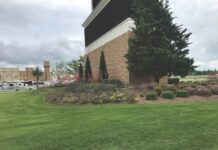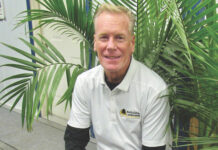Arizona company uses their assets to gain success

Asset Landscaping company photo.
PHOTOS COURTESY OF MATTHEW JOHNSON.
Asset Landscaping in Phoenix, Arizona, started in 1995 and remained a relatively small company until it was purchased in 2005 by the current owners, Matthew Johnson and Kevin Robinson, who put a new focus on professionalism, customer service and communication. What has made Asset Landscaping a success is continued attention to those values, Johnson points out. “Being accessible to clientele, as well as letting the client know if there are problems and how and when they will be remedied, can alleviate surprises that cause lack of trust,” he says. “I think this has been reinforced by our recent award from Ranking Arizona, where we ranked number two in the state for landscape contractors. We were also honored with Excellence in Landscaping awards by the Arizona Landscape Contractors Association in 2010.”
What differentiates Asset Landscaping from other companies is its use of technology, communication and the ability to help customers who are willing to learn, says Johnson. “The use of published landscape articles, monthly newsletters and social media helps get the word out about what is our focus, and how the weather influences how and what we do,” he says.
The company provides turf and irrigation system maintenance, enhancement projects, landscape construction, soil testing, soil amendments, custom fertilization, chemical weed control, arborist consulting, tree trimming, brush fire prevention, cleanups and installation and operation of ET controllers. Averaging 85 to 100 employees, the company services clients throughout the Phoenix metropolitan area and surrounding cities in Maricopa and Pinal counties. Clients are in the commercial, industrial and hospitality sectors. The company’s highest-profile account is the University of Phoenix Stadium in Glendale, home to the Arizona Cardinals football team, and also provides maintenance services to the team’s training facility in Tempe.
Most of the company’s work centers on HOAs. “Given the amount of customer service needed for this segment of the industry, our commercial clients are sometimes overwhelmed with the response and communication they receive,” says Johnson. “With homeowners’ associations, they are not just one person looking over your shoulder; everyone in the community is basically watching the job you do,” he says. “The management companies get calls or emails from people within the community, and we need to respond to every single one of those in some way, answering questions or fixing what’s wrong. A lot of companies that primarily serve the commercial market are not used to being scrutinized that much, but because we’re used to it, when something comes in, we’re on it very fast.”
One of the primary services Asset Landscaping offers its clients is water conservation education and services:
- Smartscape Certification,
- Annual irrigation field training from HD Supply, Rain Bird, Ewing, Hunter, Horizon and Toro;
- WaterWise principles on water conservation, and
- Turf maintenance instruction by Dr. David Kopec, University of Arizona Extension specialist and field researcher for turf.
Asset Landscaping also has a working relationship with the Water Business Management and Support Services Department and the HOA Water Conservation Program of the Salt River Project, Arizona’s public utility that supplies electricity and water. “Through this relationship, we have been held to a higher degree of quality on irrigation repair, maintenance and overall landscape water management,” says Johnson. When hired by a new client, the first thing the company does is test the soil and perform an operational irrigation evaluation to help determine the maintenance plan. The plan includes fertilizer applications, water conservation services and an optional water deficit program, which uses ET controllers to dial down water use until the right balance is achieved.

An Asset Landscaping crew member uses an Exmark Navigator to mow the large turf areas next to these Scottsdale townhomes.
All of the company’s foremen and supervisors are English-speaking. “It’s a premium in the industry that people have recognized to be of benefit to them,” Johnson says. “Because of dealing with homeowners’ associations, there are board members, committee members or regular homeowners that have individual requests. We don’t necessarily encourage everyone to come out and give us their requests, but occasionally there is an issue that needs to be handled, and if there’s a communication barrier where there is nobody there that can actually speak with them and get the problem handled while we’re there, it becomes a big problem.” All employees wear uniforms; supervisors wear different colors so they are easily identifiable on job sites. “We feel that the more professional you look – not only the employees but your vehicles – and the way you do your work while on-site as far as using safety features and so forth, uniforms are very important in those matters,” Johnson says. “Our uniforms are from professional companies, and are professionally cleaned and pressed. They have our name and logo on them. That’s an extra security feature for the homeowners to feel comfortable with.”

Irrigation Techs are trained to balance systems for optimum water conservation.
The company has a 24-hour pager for after-hour emergencies, such as main line breaks, stuck valves, serious storm damage and other issues that need immediate attention. “Our customer service managers and supervisors are required to return emails within 20 minutes of receiving them,” says Johnson. “Even if they don’t know the answer, they at least have to respond to say they got the message and are checking into it. If a customer calls in and says a tree fell down on the street and needs to be taken care of now, our in-house client care services person will send that email out companywide so that no matter where anybody’s at, they get an email saying a problem is happening on this property, and whoever is closest can respond with a crew. Once the job is done, a confirmation will be sent back.”

After this community was built, several areas drained water and began to wash away the decomposed granite. These areas are being dug out to create a channel and will be filled with Rip Rap to alleviate erosion and increase the aesthetic appeal.
Supervisors complete a daily log of properties visited, time on property and a property rating. Johnson and Robinson both sign the reports and are aware of each property’s status. Service or irrigation needs resulting from quality control visits are logged into the software tracking system and handed off to the proper personnel for follow-up. Supervisors also carry digital cameras to provide extra documentation as needed. “Like anyone, we’re human,” says Johnson. “We’re not infallible, but if there are issues on the property or something looks really good, we encourage everybody to take photos of both.” The pictures helps clients understand problems and what it takes to mitigate them, Johnson adds.

With respect to equipment, Johnson says because of the sheer amount of debris on the job, “we love to utilize the medium-duty cab-over dump trucks, such as the Mitsubishi Fuso and Isuzu NPR. Due to the amount of turf we mow, we utilize the speed and clean mowing of the Exmark Lazer and Hustler zero-turn mowers,” he adds. “For the smaller and more manicured areas, the Exmark Navigator has performed very well. We also have utilized the Grasshopper system for ball field mowing and aeration. The spike aeration with the vibrating tines has been extremely effective in aerating large areas with hardpan and surface tension.”

Large capacity trucks, such as this Mitsubishi Fuso, can transport and haul large volumes of debris, and overhead warning lights help keep other drivers and the crew safer.
The company works closely with the Arizona Landscape Contractors Association (ALCA), and Johnson says, “We feel that the more professional an industry presents itself, the more respect will be earned by customers.” To that end, Asset Landscaping follows principles and practices outlined in the book “Sustainable Landscape Management: Standards for Landscape Care in the Desert Southwest” by Janet Waibel, landscape architect and certified arborist, and adopted by the ALCA as standards for landscape management. “She would do these great designs, and after it was installed, she would come back to look at it and there would be all of these things improperly maintained,” says Johnson. So, Waibel wrote maintenance standards on how to maintain her designs. The book was peer-reviewed by an ALCA committee, including contractors, irrigation and landscape professionals. After eight months of revisions, the end product was not only something that is horticulturally correct, but also something that can be logically applied in the field, Johnson says. “It outlines our philosophy very well,” says Johnson. “Let the landscape do what it is supposed to do while using techniques such as renovation pruning to guide or even control the growth pattern so it looks properly managed.”
With temperatures ranging from 110 degrees in summer and sometimes dipping below the upper 20s in winter, one of the biggest challenges for the company is “making sure that plants brought from other climate zones, and even other countries, are either removed from the palette or learn how to care for them,” notes Johnson. “Native plant life does very well for the most part without help,” Johnson explains. “Sometimes native species are pruned and watered as nonnative species are, and this causes issues as well. Very few areas in the country use overseeding to keep turf green both summer and winter. Bermudagrass cannot remain active during the cold winters, and perennial or annual rye cannot live through the summer. While hybrids have tried to fill the gap, nothing has been effective enough to become mainstream.”

Large turf areas are managed with Hustler Z series mowers and large capacity catchers for winter ryegrass that is traditionally too wet to mulch.
Asset Landscaping is affiliated with the GreenCare for Troops program in which landscape professionals provide free lawn and landscape services for U.S. soldiers while they are deployed. “We are proud to be part of that,” says Johnson. “We probably serve 20 individuals with that. It’s been a real pleasure. We’ve gotten so many nice letters from people – for the ones who have served and come home, it’s been really nice.”
The company’s biggest challenge has been dealing with customers who, as a result of the economy, consider price the only factor when seeking landscape maintenance services. “Therefore, companies that cannot provide the level of service we are set up for are undercutting the market,” Johnson says. “This, ultimately, is declining the professionalism in the industry.” Fuel costs are another concern. “With the number of miles driven each week and the size of the valley, we can only focus on route efficiency and keeping equipment running as efficiently as possible,” he adds.
Johnson is ALCA’s president-elect and will begin his term in 2013. He intends to increase public relations efforts for the organization. “We want to serve our members more by getting the name of the ALCA out into the public and have the public understand what it is and why they should look for people who are members,” he says.
For the future, Johnson is hoping to see a turn to more sustainable methods that will allow his company to excel. “Most people will have seen the ‘get-what-you-pay-for’ experience and be more ready to look again at quality work,” he predicts. He sees his company as an integral part of the industry, with ALCA leading the way in increasing awareness of professional industry practices. “We are looking positively on the industry moving forward,” he says.











![[VIDEO] Dickies®: Discover Workwear That’s Anything But Uniform](https://turfmagazine.com/wp-content/uploads/2023/06/1647663814-4b1a2a7742790a9b1e97a3b963477850192e1d6a9dfba9b07214a77bae25d6e3-d-218x150.jpg)




























![[VIDEO] Dickies®: Discover Workwear That’s Anything But Uniform](https://turfmagazine.com/wp-content/uploads/2023/06/1647663814-4b1a2a7742790a9b1e97a3b963477850192e1d6a9dfba9b07214a77bae25d6e3-d-324x160.jpg)